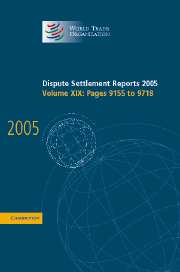Book contents
- Frontmatter
- Contents
- European Communities – Customs Classification of Frozen Boneless Chicken Cuts (WT/DS269, WT/DS286): Report of the Appellate Body
- European Communities – Customs Classification of Frozen Boneless Chicken Cuts - Complaint by Brazil (WT/DS269): Report of the Panel
- Cumulative List of Published Disputes
European Communities – Customs Classification of Frozen Boneless Chicken Cuts (WT/DS269, WT/DS286): Report of the Appellate Body
Published online by Cambridge University Press: 13 December 2017
- Frontmatter
- Contents
- European Communities – Customs Classification of Frozen Boneless Chicken Cuts (WT/DS269, WT/DS286): Report of the Appellate Body
- European Communities – Customs Classification of Frozen Boneless Chicken Cuts - Complaint by Brazil (WT/DS269): Report of the Panel
- Cumulative List of Published Disputes
Summary
INTRODUCTION
The European Communities, as appellant, and Brazil and Thailand, as other appellants, each appeal certain issues of law and legal interpretations developed in the Panel Reports, European Communities – Customs Classification of Frozen Boneless Chicken Cuts (the “Panel Reports”). The Panel was established to consider complaints by Brazil and Thailand concerning certain measures of the European Communities, pertaining to the classification of frozen boneless salted chicken cuts for tariff treatment.
Brazil and Thailand claimed before the Panel that Commission Regulation (EC) No. 1223/2002 (“EC Regulation 1223/2002”) and Commission Decision No. 2003/97/EC (“EC Decision 2003/97/EC”) resulted in tariff treatment for frozen boneless salted chicken cuts that is less favourable than that provided for in the European Communities’ Schedule LXXX (the “EC Schedule”), in violation of Article II:1(a) and/or Article II:1(b) of the General Agreement on Tariffs and Trade 1994 (the “GATT 1994”). More particularly, Brazil and Thailand alleged that, through the challenged measures, “the European Communities changed its customs classification so that those products, which had previously been classified under subheading 0210.90.20 and were subject to an ad valorem tariff of 15.4%, are now classified under subheading 0207.41.10 and are subject to a tariff of 102.4€/100kg/net as well as being potentially subject to special safeguard measures pursuant to Article 5 of the Agreement on Agriculture.”
Brazil and Thailand also claimed before the Panel that, although Commission Regulation (EC) No. 1871/2003 (“EC Regulation 1871/2003”) and Commission Regulation (EC) No. 2344/2003 (“EC Regulation 2344/2003”) were not mentioned specifically in their requests for the establishment of a panel, these Regulations must be considered as part of the challenged measures because they are “closely related” to and based on the same principle of long-term preservation, as set out in the challenged measures. Brazil and Thailand also alleged that the specific products at issue were “frozen boneless salted chicken cuts that have been deeply and homogeneously impregnated with salt in all parts with a total salt content of not less than 1.2% by weight”, and that the terms of reference are not limited to products with a salt content between 1.2 and 3 per cent.
- Type
- Chapter
- Information
- Dispute Settlement Reports 2005 , pp. 9157 - 9294Publisher: Cambridge University PressPrint publication year: 2007
- 3
- Cited by

